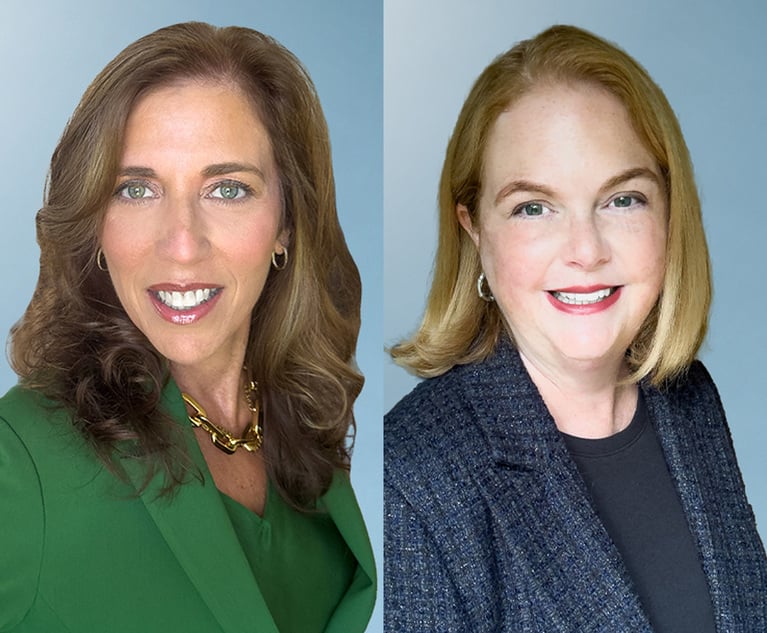 Tessa Schwartz, managing partner, Morrison & Foerster (Photo: Courtesy photo)
Tessa Schwartz, managing partner, Morrison & Foerster (Photo: Courtesy photo)Women Leaders in Tech Law 2018: Tessa Schwartz, Morrison & Foerster
'Since our clients are trailblazers in their industries, they expect us to be innovative as well,' says Schwartz, a MoFo managing partner. 'This means that we have to imagine and prepare for the practice of law in five to 10 years so we remain indispensable to our clients.'
November 13, 2018 at 09:40 AM
5 minute read
Schwartz, a managing partner at MoFo, led the IP and privacy teams on Salesforce's $6.5 billion acquisition of MuleSoft, the company's largest-ever acquisition.
Name a lawyer whose work you admire and why?
My dad, who started practicing law fifty years ago. Some things have changed during that time, but his approach stands the test of time. You need to master the facts and the law, and then you need to take a creative approach to meet client objectives.
What's the best piece of career advice anyone ever gave you?
Attitude is everything. Have a can-do attitude. See new matters and clients as an opportunity, not work. Engaging with opportunities—no matter how big or small—leads to new relationships and provides great opportunities to learn about new technologies and areas of the law. One of the associates in my group has a framed “Will do!” sign on his desk. I made it for him.
What's the best part about working in the tech sector?
I've had the good fortune of being at the top technology law firm in the Bay Area, the epicenter of the technology sector, where we represent clients on cutting-edge and market impacting matters. The best part of this job is that I get a “first look” at new technologies and new business models. My job is never boring—it is always being reinvented with technology innovations.
What's the biggest challenge?
Our clients include some of the most innovative companies in the world. They are disruptors in their sectors, in some ways changing entire business models or creating entirely new product types. Since our clients are trailblazers in their industries, they expect us to be innovative as well. This means that we have to imagine and prepare for the practice of law in five to 10 years so we remain indispensable to our clients.
What piece of advice do you give to lawyers considering a career in tech law?
In tech, you are “always on.” Deals and other matters move quickly. You sometimes have to slow down to see the full picture and align your recommendations with your clients' business objectives.
What's one way technology has made your life easier?
More virtual meetings, modes of communication, and collaborative tools enable us to quickly create talented inter-office and global teams. That means I can easily access the best talent for each client.
One way it's made your life more difficult?
The “always on” mentality and the expectation of instant responses can be challenging. Our job is to provide thoughtful and practical advice for clients. In some cases, the end work product is a set of easily digestible bullet points or a short recommendation, but we also need the ability and time to ingest large volumes of information and analyze the best approach based on the client objectives and the law.
Name an important opportunity you got early in your career and what you did with it?
I was a litigator out of law school and started to get headhunter calls to join tech companies. Those opportunities helped me understand that I could transition to a technology transactions practice. With the support of two partners at my firm (who are still mentors today), I was given the opportunity to move over to the transactional side. That opportunity jump-started my legal career.
No. 1 survival tip in a work crisis:
Don't over-caffeinate.
What's one way you've had to change your thinking toward practicing law to succeed with tech industry clients or in-house at a technology company?
In some ways, the technology sector used to be the “Wild West.” Technology companies could create new products with less focus on the regulatory environment by staying a step ahead of regulation. Now, I think the regulators are becoming increasingly savvy, and our tech clients need to understand regulations and execute their business goals within regulatory frameworks more than ever before. Increasingly, even IP lawyers need to advise clients not just on “IP” issues but also on regulatory issues, including new privacy regulations. We've expanded our D.C. regulatory practices to address this shift.
What's one area of technology that you're most excited about and why?
I am excited, awed and to some degree concerned about the power of artificial intelligence and robotics to quickly evolve businesses and the economy, and our relationship with technology. On a recent trip, I was sitting on a plane to San Francisco, and seated next to me was a founder of an AI edtech company, as well as the CFO of an enterprise SaaS blockchain company that uses AI. AI is here to stay, and we definitely can't ignore it.
This content has been archived. It is available through our partners, LexisNexis® and Bloomberg Law.
To view this content, please continue to their sites.
Not a Lexis Subscriber?
Subscribe Now
Not a Bloomberg Law Subscriber?
Subscribe Now
NOT FOR REPRINT
© 2024 ALM Global, LLC, All Rights Reserved. Request academic re-use from www.copyright.com. All other uses, submit a request to [email protected]. For more information visit Asset & Logo Licensing.
You Might Like
View All

Faegre Drinker Adds Three Former Federal Prosecutors From Greenberg Traurig
4 minute read
Anapol Weiss Acquires Boutique Led by Star Litigator Alexandra Walsh
5 minute read
Pierson Ferdinand Lures Veteran M&A Specialist From Sheppard Mullin in Silicon Valley
4 minute readTrending Stories
- 1Call for Nominations: Elite Trial Lawyers 2025
- 2Senate Judiciary Dems Release Report on Supreme Court Ethics
- 3Senate Confirms Last 2 of Biden's California Judicial Nominees
- 4Morrison & Foerster Doles Out Year-End and Special Bonuses, Raises Base Compensation for Associates
- 5Tom Girardi to Surrender to Federal Authorities on Jan. 7
Who Got The Work
Michael G. Bongiorno, Andrew Scott Dulberg and Elizabeth E. Driscoll from Wilmer Cutler Pickering Hale and Dorr have stepped in to represent Symbotic Inc., an A.I.-enabled technology platform that focuses on increasing supply chain efficiency, and other defendants in a pending shareholder derivative lawsuit. The case, filed Oct. 2 in Massachusetts District Court by the Brown Law Firm on behalf of Stephen Austen, accuses certain officers and directors of misleading investors in regard to Symbotic's potential for margin growth by failing to disclose that the company was not equipped to timely deploy its systems or manage expenses through project delays. The case, assigned to U.S. District Judge Nathaniel M. Gorton, is 1:24-cv-12522, Austen v. Cohen et al.
Who Got The Work
Edmund Polubinski and Marie Killmond of Davis Polk & Wardwell have entered appearances for data platform software development company MongoDB and other defendants in a pending shareholder derivative lawsuit. The action, filed Oct. 7 in New York Southern District Court by the Brown Law Firm, accuses the company's directors and/or officers of falsely expressing confidence in the company’s restructuring of its sales incentive plan and downplaying the severity of decreases in its upfront commitments. The case is 1:24-cv-07594, Roy v. Ittycheria et al.
Who Got The Work
Amy O. Bruchs and Kurt F. Ellison of Michael Best & Friedrich have entered appearances for Epic Systems Corp. in a pending employment discrimination lawsuit. The suit was filed Sept. 7 in Wisconsin Western District Court by Levine Eisberner LLC and Siri & Glimstad on behalf of a project manager who claims that he was wrongfully terminated after applying for a religious exemption to the defendant's COVID-19 vaccine mandate. The case, assigned to U.S. Magistrate Judge Anita Marie Boor, is 3:24-cv-00630, Secker, Nathan v. Epic Systems Corporation.
Who Got The Work
David X. Sullivan, Thomas J. Finn and Gregory A. Hall from McCarter & English have entered appearances for Sunrun Installation Services in a pending civil rights lawsuit. The complaint was filed Sept. 4 in Connecticut District Court by attorney Robert M. Berke on behalf of former employee George Edward Steins, who was arrested and charged with employing an unregistered home improvement salesperson. The complaint alleges that had Sunrun informed the Connecticut Department of Consumer Protection that the plaintiff's employment had ended in 2017 and that he no longer held Sunrun's home improvement contractor license, he would not have been hit with charges, which were dismissed in May 2024. The case, assigned to U.S. District Judge Jeffrey A. Meyer, is 3:24-cv-01423, Steins v. Sunrun, Inc. et al.
Who Got The Work
Greenberg Traurig shareholder Joshua L. Raskin has entered an appearance for boohoo.com UK Ltd. in a pending patent infringement lawsuit. The suit, filed Sept. 3 in Texas Eastern District Court by Rozier Hardt McDonough on behalf of Alto Dynamics, asserts five patents related to an online shopping platform. The case, assigned to U.S. District Judge Rodney Gilstrap, is 2:24-cv-00719, Alto Dynamics, LLC v. boohoo.com UK Limited.
Featured Firms
Law Offices of Gary Martin Hays & Associates, P.C.
(470) 294-1674
Law Offices of Mark E. Salomone
(857) 444-6468
Smith & Hassler
(713) 739-1250






